Weekly Update - September 13, 2024

Novel

Miscellaneous
"If a tree falls in a forest, and no one is around to hear it, does it make a sound?"
- Check link on Wikipedia.
If a poem is written, and no one reads it, is it still a poem?
I published this poem on Facebook first - so it's not eligible for a lot of magazines.
College kids, am I right?
No other job than posting things on Facebook, and losing first world rights. Now New Yorker won't even look at it.

Anyway, that poem is being republished, and the link is here.
Miscellaneous II
I won Mount and Blade: Bannerlord, after nearly 200 hours of gameplay. Will explain more below. This post has spoilers for the game, especially the campaign.
The game features several empires, mimicking famous medieval empires, such as the Vikings, the Arabs, the English, the Mongols, the Romans, and the Celts. These kingdoms have clans, but there are also clans willing to defect, and several minor factions that work as mercenaries.
You start at level 0, and have multiple routes of how you want to play.
Available play styles are being a mercenary, a lord, a soldier, a trader, a gang leader, a merchant, or a bandit.... or all of them. Male, or female.
The game plays largely like a simulator - you make decisions, send your troops to war, decide who's side you want to take, arm your troops, hope your caravan doesn't get attacked, decide which gangs to support, and if you win the tournament when you bet on yourself, you earn a lot!
(Or, you can do betting fraud....some gang leaders have missions like that)
As you make your decisions, the world changes.
The game is a living world - for example, in times of war, bandits increase and prey on the villagers. Major characters die - kings die of old age, or in battle. One of my characters was ambushed, and killed.
Where it gets interesting is, you can fight on the field, and you fighting badly derails everything.
You, as in me. Me as in, Mattis.
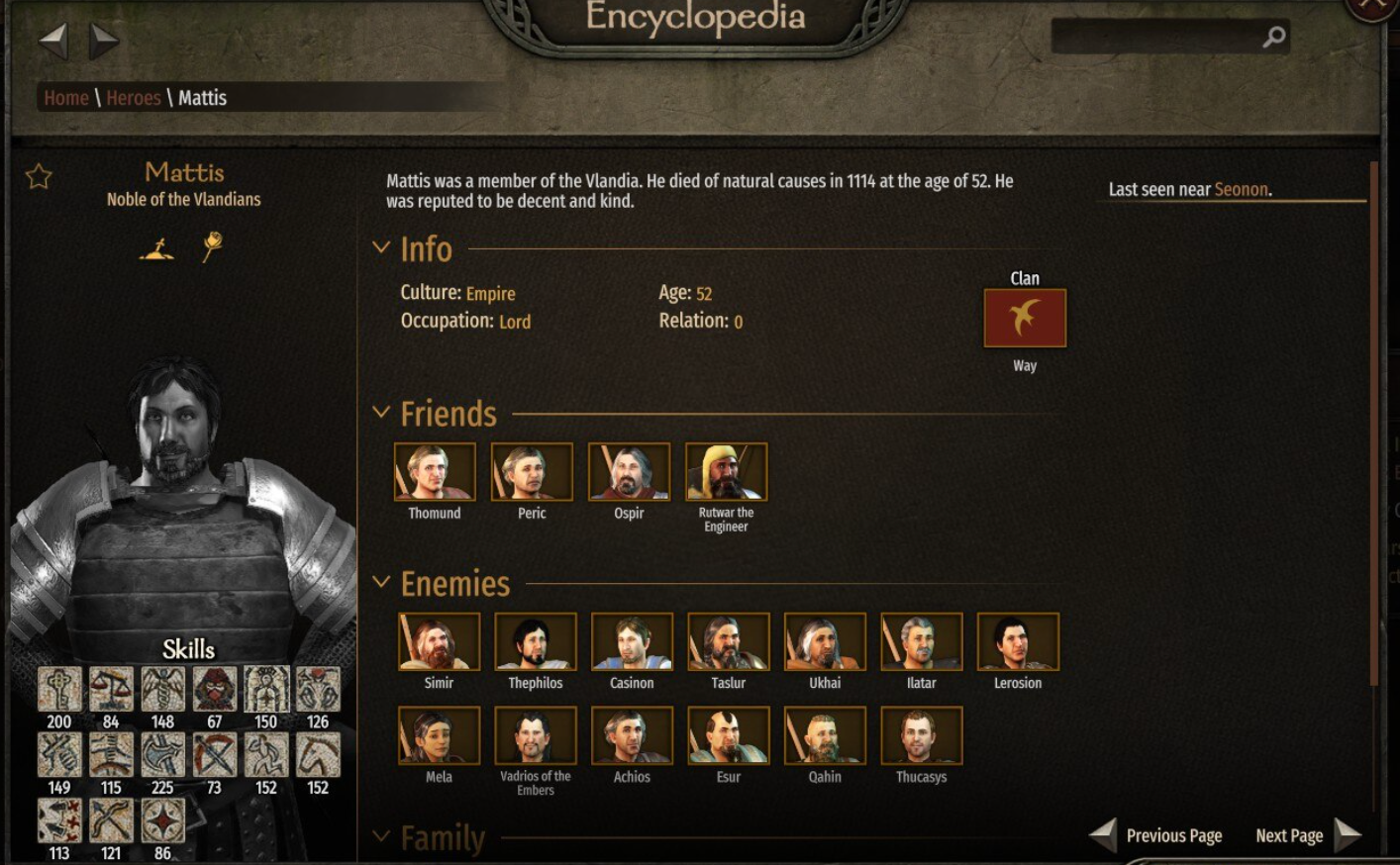
Seeing as how I had troops equal to an enemy lord, I fought him on the field. We were massacred - their horses, armor and experience were much better than my armies' - I was taken prisoner.
(Being taken prisoner happened a lot)
Once I lost a battle of real superiority because the archers didn't have line of sight while firing...My infantry was fighting in front of them, and my archers were massacred.
....Complete disaster.

Bad leadership......I surrendered.
Point being it's only a simulator when it comes to other people, and systems - for better or worse, I still have control of my own army.
It's also a physics simulator - when it snows, or rains, the archer's arrows are slower, and the horses move much slower.
Skill is valued - for example, it took me a long while to be able to shoot the bow, especially while riding. Riding on horseback increases charge damage.
The game doesn't judge your decisions, but there are huge consequences. For example, I was given the task of getting rid of poachers hurting the merchant's business. They would stay in the village, and scare the villagers.
I was able to negotiate with them - and ended up avoiding a battle. Didn't expect that at all. They gave me their poached goods with gratitude.
Another time, negotiations failed and I chose to fight. Again, I didn't expect that.

Game designers, take note - when players feel rewarded for playing along in-game, it makes the game more realistic.
As the heir to a dying clan, I worked as a mercenary. I finally joined my clan into an existing empire, and several decades later, after joining another empire as a lord...died.
I forgot I set that feature of permanent death on, and as my character reached old age, I joined my king's army in a battle. Was killed.
This happened while I was in India, and took me by shock. Complete surprise - and I was asked to choose a heir.
I chose my brother's wife.
She was a heavy cavalry unit, and I had to get used to fighting with a female character - she was quicker, but not that strong.
My main character was extremely developed, and I didn't want to level another character all the way again. Thankfully, the Dragon Banner got passed on to her, along with his armor and cavalry sword.
Let's backpedal - I need to explain the story.
The single player mode has this concept of The Dragon Banner.
Before I enter the picture, the king died, and a huge civil war had taken place. General unrest - 3 major empires blame the other 3.
With the emperor dead, though, all the subjugated empires blame each other for the losses in the final war, and resume fighting each other.
The main empire itself (the romans) split into 4 different empires - north, south, east and west.
Now....once I assembled the dragon banner, I was asked to pick between 2 of the dead emperor's assistants. By now I had some money, a lot of experience, and was beginning to understand how the game worked.
One wanted the death of the central empire. They made this empire very imperialistic, like the Romans in our world, and he didn't like how they conquered and standardized everything, leading to local cultural loss.
The other wanted the central empire to continue - she was his ex-spy master, and she felt that stability was very important. If I chose her path, she would give me her network.
I think this Dragon Banner idea is the archetype of having a claim to the throne, irrespective of actual evidence. This happens in a recent Tamil movie, too.

I picked the first assistant - though at this point I had no idea what I was supposed to do - end an empire? Which one? There were at least 6, and each empire had several clans.
This guy specifically meant the 4 central empires - say, east Romans, west Romans, north Romans, and south Romans.
They were surrounded by the English, the Mongols, the Arabs, the Celts and the Vikings, and I didn't know he meant only the 4 central ones.
These 4 were fighting each other, and as one empire grew strong, it's neighbors would start getting ideas. Political science is real.

After I helped the Vlandians (English) with the destruction of the Khuzaits (Mongols) I realized the word 'Empire' meant the central 4 empires - not all 6.
He specifically wanted the central empires to lose power, so local traditions could be preserved, and I didn't know the central 4 were Empires, and not just a generic empire.
.....Felt very bad for misunderstanding.

The ex-spy master lent her support to these 4 central empires....She became my enemy, without warning.
Again, makes sense, but I didn't want to make enemies.
Finally, war.
By this time, she started sabotaging me, and killing my supporters through her network.
Since my caravans were getting attacked by the romans, money was low too. The Romans were in the center of the map, so they controlled the center of the board.
So with my several companions, riches, good martial skills, 2 workshops, and huge army, I joined this campaign.
I made myself responsible for several pushes - conquered forts, or attacked war parties. I didn't attack villages, or caravans, but the enemy was not so kind.
Once the king joined my siege of a fort, and I left, thinking he had things in control. A day later he retreated, and my effort was wasted. If he had not joined, I would have conquered it.
(even as a lord, while I have power, on the field, the highest ranking official gets first pick - so if King decides I fight with the infantry, I can't really say no.
I am also given his special infantry - I think the idea is king knows best and he will give you the resources you need)

I thought I learned everything - I could fight, I could lead an army, and I could marshall the king's armies too. Also, I already won a lot of battles.
But I actually lost a lot of battles. Fighting a war on such a scale was a logistics nightmare.
Some armies would arrive late.
Cavalry are not good in swamps.
Large armies moved very slow - size wasn't necessarily a better idea.
Lot's of men meant lot's of food, lot's of money, and painfully slow movement. Once the army disbands, we were all sitting ducks.

Large army meant battles had to happen - otherwise logistically I was paying for a lot of muscle men with no gold captured, or goods to contribute to income. The peasants at home were paying a lot of good money to support these armies, you know?
Smaller parties would retreat, so having an army larger than 500 soldiers was a waste, unless to block a bridge, or threaten a siege.
I won a battle - and I was excited because I had prisoners, money, and the morale was high. All this made my army move extremely slow, and before my soldiers recovered from their wounds, I.....was captured, and became a prisoner. My prisoner was freed by my captor.
After I started conquering forts, with fellow lords and ladies, I was given the option of pillaging the fort, or leaving as is. If I chose to pillage the fort, the 'merciful' commanders won't like it - otherwise, the 'cruel' commanders won't like it. I always chose to be merciful, but I was notified that my soldiers were grumbling about the lack of spoils. Morale fell a lot.
I forgot to buy food once, so I stopped by a nearby town - food was not there.
Once on entire village was decimated - while the lords fight, the peasants starve. Very grim.
Battles were difficult to win, but wars were a completely different matter.
Back to my sister in law. My in-game brother got a proposal, and I accepted, because I didn't think it through.
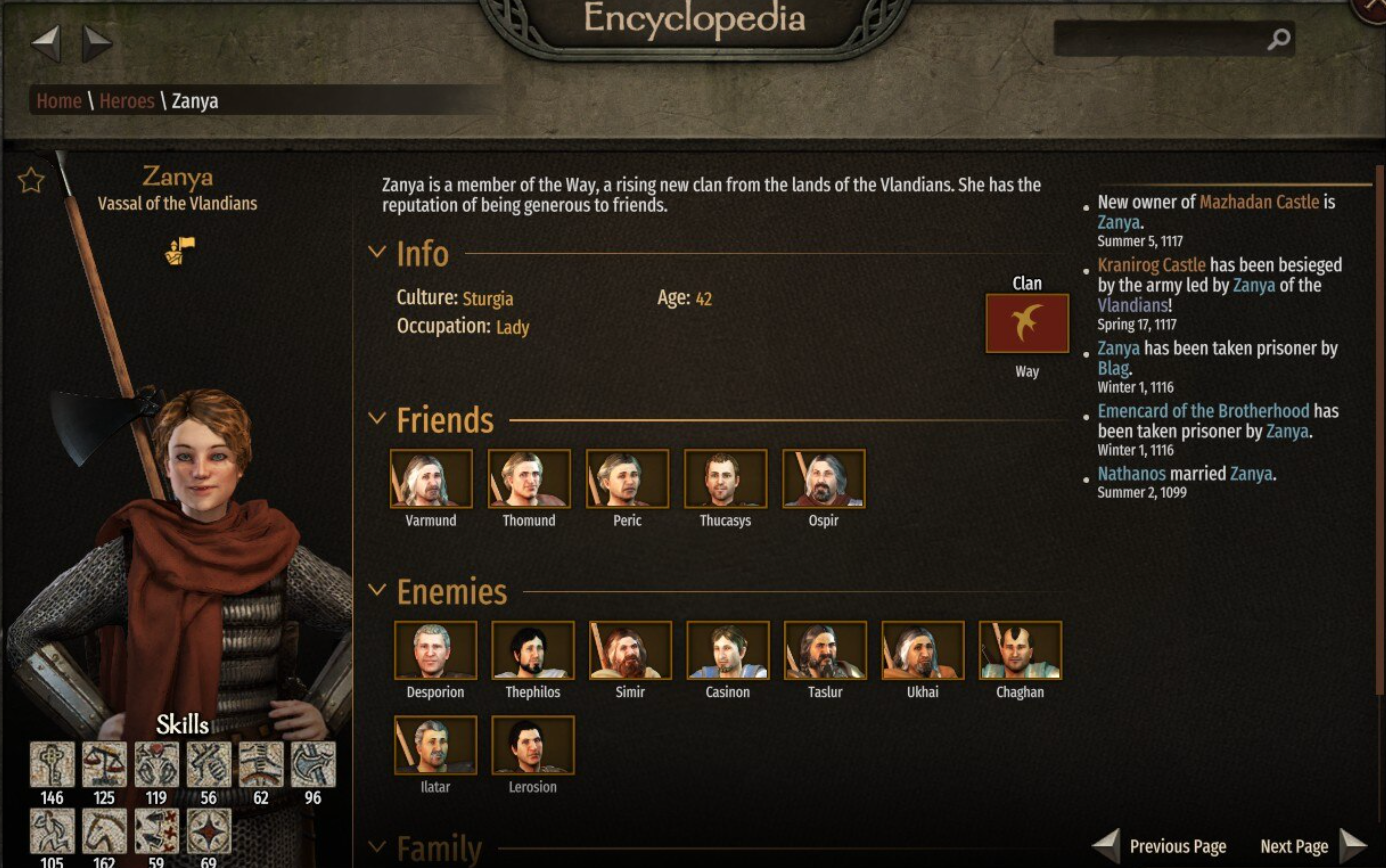
And then, in India, I died, and chose my sister-in-law to continue the quest in the name of the Dragon banner. Not my brother.
She wasn't that strong, and I actually retreated to her Vlandian capital.
I had to rethink everything - my clan members were now dying of old age, and I learned a lot from my previous character.
However, the pushes I made earlier made a big difference - the Vlandian king finally got his act together, and I could just fight normally.
That quest ended this Tuesday, finally.
I was shown a cutscene for uniting Calradia under the Dragon banner.
And was given the statistics of my victory.

Screenshot I - General Statistics
The crime rating below was a misunderstanding - a lady asked me to investigate a potential spy.
She gave me a lead, and I investigated by talking to the town folk. I found the guy - the spy was bald, but he wasn't.
I forgot that clue, and challenged him to a duel, and won. He died....but he wasn't the spy. She wasn't happy at all.
I didn't know he would die though.
I recruited 462 prisoners - enemies, and even looters and bandits.
Morale would plunge.
Later in the game, Mattis got a perk which allowed me to recruit prisoners without losing morale - must be some kind of alpha thing.
(I am telling you soldiers - where we all not bandits at one point? Are we not fighting for our lives? Who are we to judge these bandits?)
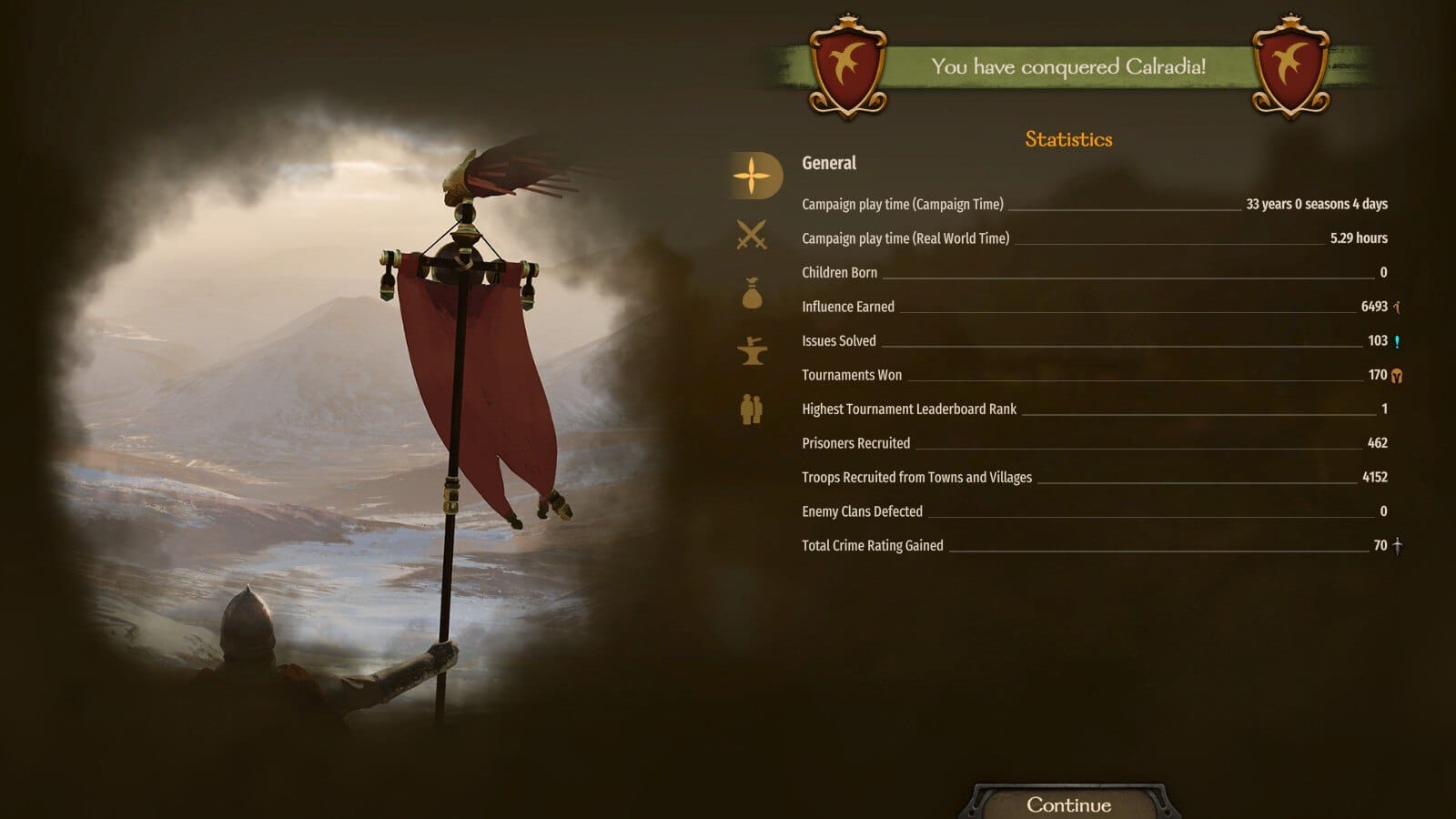
Screenshot II - Battles
Heroes killed in battle: 8
Captured Towns and Castles: 19
Raided Villages: 0
Cleared Bandit Hideouts: 64
Raiding villages is a very cruel, but effective tactic - the king is then forced to divert forces there.
If the owners don't get there in time, the village doesn't stand a chance against knights or horse raiders.
In addition to not attacking villages, or caravans, I never beheaded a captured noble. I would put them in a dungeon - the lord of that castle would then decide if ransom will be taken or not.
I usually didn't take the ransom, closer to victory, because the lord would go back, recruit, and attack again.

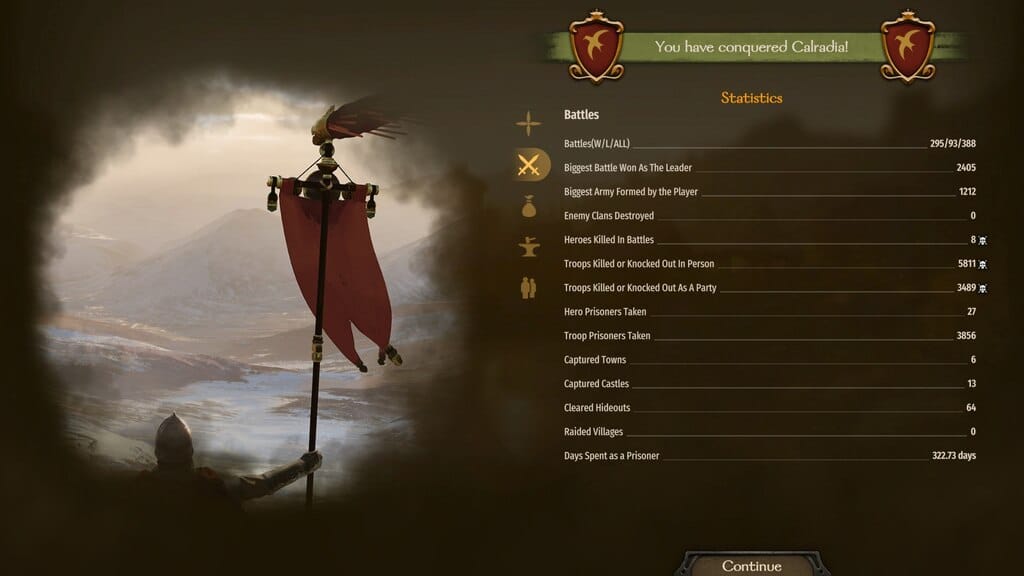
Screenshot III - Finances
I had a diversified portfolio.....Caravans, workshops, ransoms from capturing nobles, several fiefs, you name it.
I was the street of Wall, in the kingdom of Vlandia.
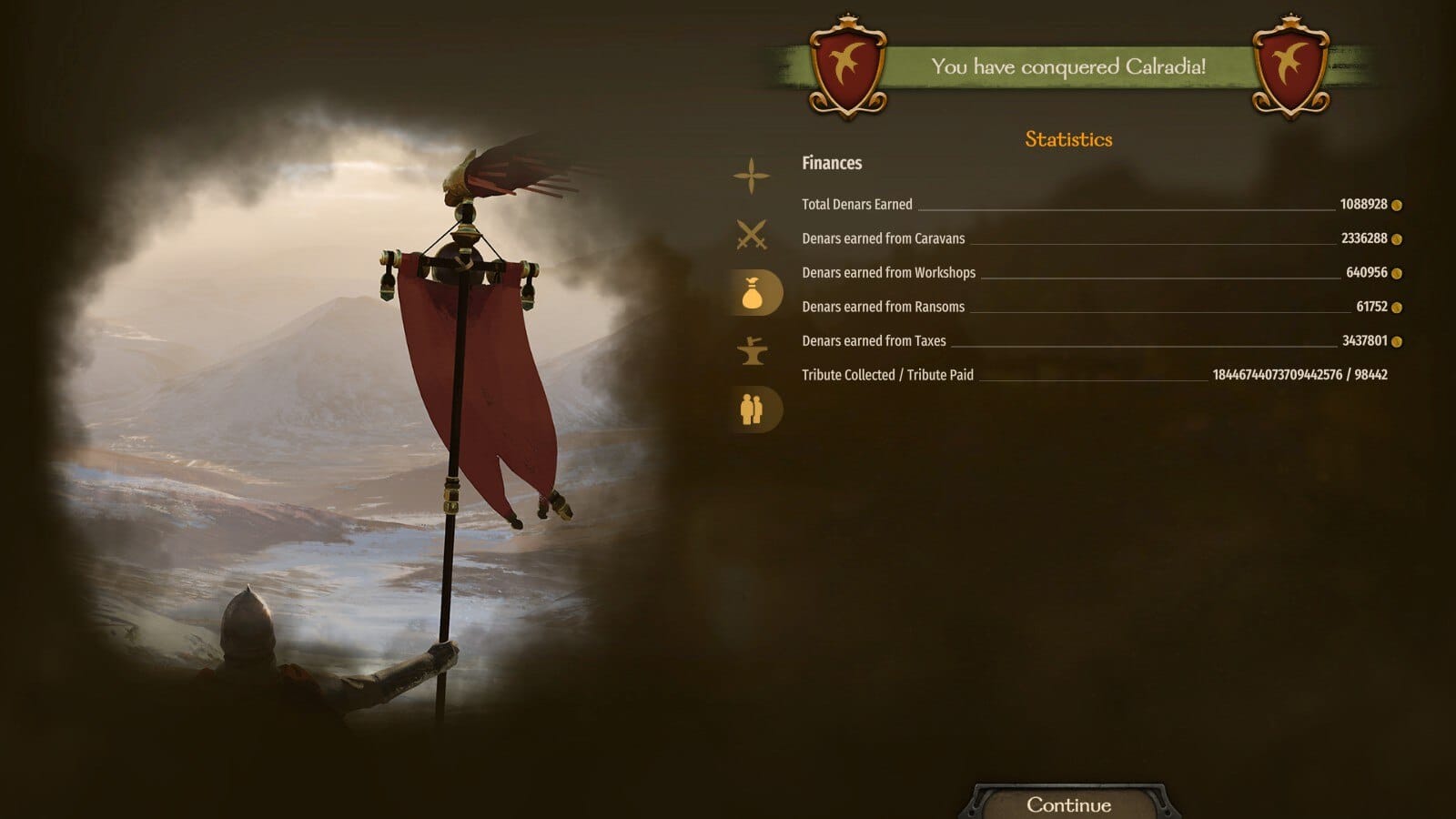
Conclusion
- I was once close to finishing my siege, but my soldiers were starving. I needed a day more - once the siege engines were finished, and then I attacked, my men were more likely to survive. Usually the leaders would attack on day 1 or 2, but I would wait 30 days - once their catapults were broken, there would be limited casualties on both sides. We didn't need the horses anymore.
- Once I figured out based on the simulator physics, I could wound soldiers (instead of killing them) I started doing that. And praised the game designer.
- Another time, I retreated from a battle - the odds were impossible. One of my companions got angry with me, citing cowardice, and still, I lost 70 men and lot's of goods in the process.
- Some gangs would prefer to hire the bandits you capture - their argument is that they can continue to drink, gamble and be illegal, without necessarily hunting and robbing villagers. Makes sense to me. It's a win for the gangs, a win for the bandits, and no blood would be spilt. If my army was huge, the bandits would surrender on sight.
Being a kind leader is hard - everyone has a problem with everything, but few have the competence, desire or compassion to do something about it.
You need to make difficult decisions, but without forgetting your compassion.

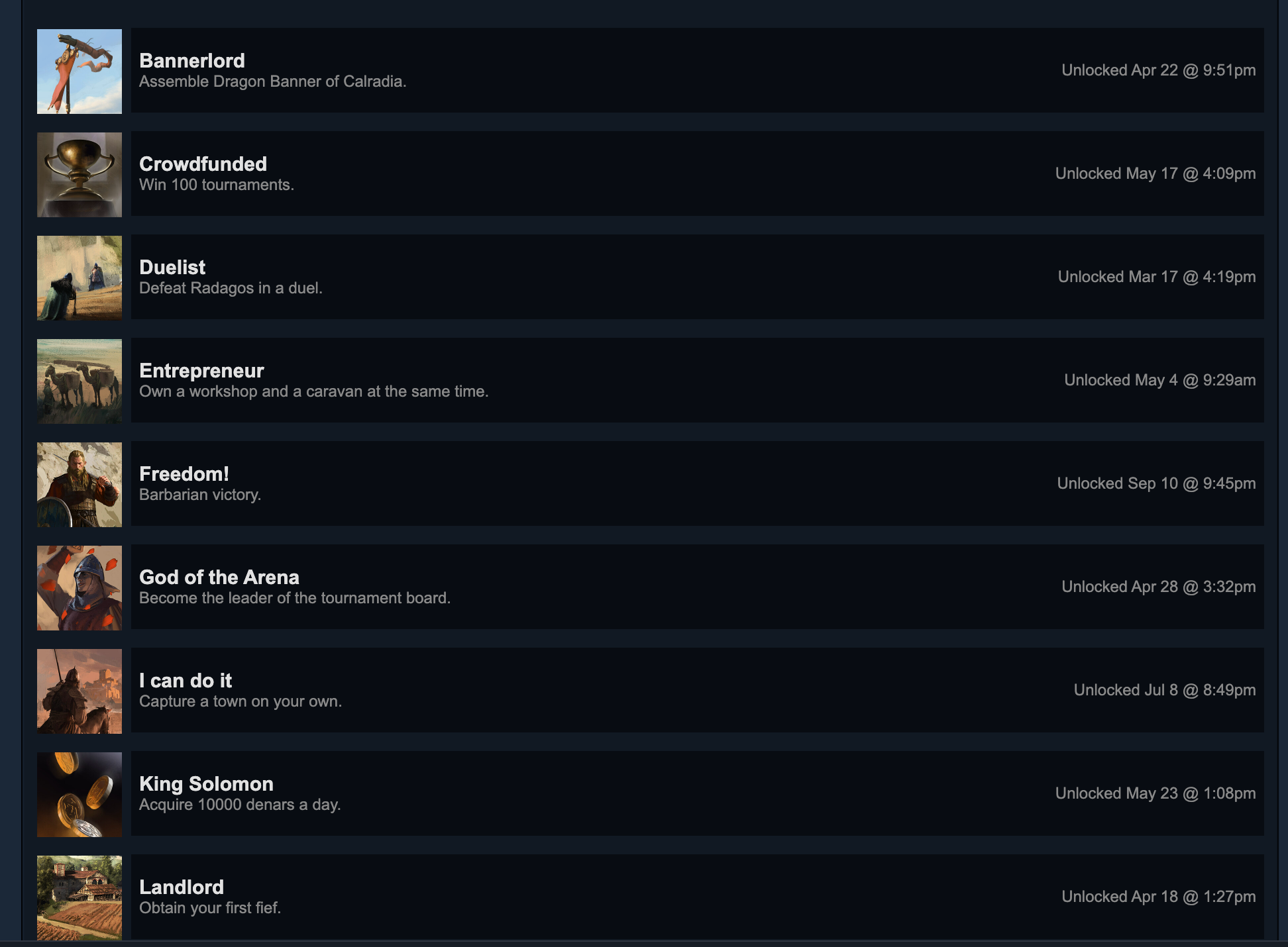
Member discussion